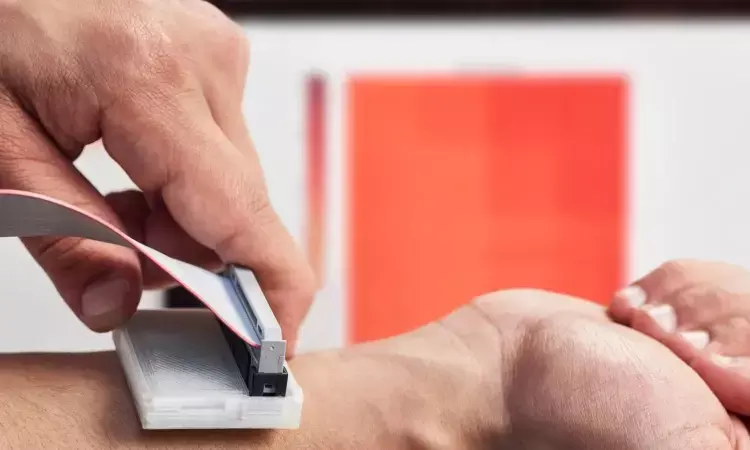- Home
- Medical news & Guidelines
- Anesthesiology
- Cardiology and CTVS
- Critical Care
- Dentistry
- Dermatology
- Diabetes and Endocrinology
- ENT
- Gastroenterology
- Medicine
- Nephrology
- Neurology
- Obstretics-Gynaecology
- Oncology
- Ophthalmology
- Orthopaedics
- Pediatrics-Neonatology
- Psychiatry
- Pulmonology
- Radiology
- Surgery
- Urology
- Laboratory Medicine
- Diet
- Nursing
- Paramedical
- Physiotherapy
- Health news
- Fact Check
- Bone Health Fact Check
- Brain Health Fact Check
- Cancer Related Fact Check
- Child Care Fact Check
- Dental and oral health fact check
- Diabetes and metabolic health fact check
- Diet and Nutrition Fact Check
- Eye and ENT Care Fact Check
- Fitness fact check
- Gut health fact check
- Heart health fact check
- Kidney health fact check
- Medical education fact check
- Men's health fact check
- Respiratory fact check
- Skin and hair care fact check
- Vaccine and Immunization fact check
- Women's health fact check
- AYUSH
- State News
- Andaman and Nicobar Islands
- Andhra Pradesh
- Arunachal Pradesh
- Assam
- Bihar
- Chandigarh
- Chattisgarh
- Dadra and Nagar Haveli
- Daman and Diu
- Delhi
- Goa
- Gujarat
- Haryana
- Himachal Pradesh
- Jammu & Kashmir
- Jharkhand
- Karnataka
- Kerala
- Ladakh
- Lakshadweep
- Madhya Pradesh
- Maharashtra
- Manipur
- Meghalaya
- Mizoram
- Nagaland
- Odisha
- Puducherry
- Punjab
- Rajasthan
- Sikkim
- Tamil Nadu
- Telangana
- Tripura
- Uttar Pradesh
- Uttrakhand
- West Bengal
- Medical Education
- Industry
First AI-powered non-invasive device for skin cancer detection receives FDA clearance

USA: The US FDA (Food and Drug Administration) has announced clearance of an artificial intelligence (AI)-powered device designed for non-invasive detection of skin cancer in the primary care setting.
The device uses AI-powered spectroscopy technology to non-invasively evaluate subcellular and cellular characteristics of a lesion for any of the three common skin cancers -- melanoma, squamous cell carcinoma, and basal cell carcinoma. The wireless, handheld device then provides a result in real-time using an FDA-cleared algorithm.
According to the FDA, the device -- which will be available by prescription -- is indicated for the evaluation of skin lesions in patients 40 years and over, and to assist healthcare providers in determining whether to refer a patient to a dermatologist.
"To date, primary care physicians' limited options for evaluating suspicious moles have been the naked eye or magnified visual examination of lesions, both of which are dependent on clinical training and subjective judgment," developer DermaSensor stated in its press release.
"But now, physicians can use DermaSensor’s AI-powered spectroscopy technology to non-invasively evaluate cellular and subcellular characteristics of a lesion in question for skin cancer. The wireless, handheld device then provides an immediate, objective result using an FDA-cleared algorithm."
The clearance was based on a study of 1,005 patients across 22 centres that showed 96% sensitivity of the device in detecting skin cancers, while a negative result had a 97% chance of being benign for all skin cancers.
A companion clinical utility study with 108 physicians, revealed that the use of the device reduced the number of missed skin cancers by half (from 18% to 9%).
The device should be used on lesions already assessed as suspicious for skin cancer, the agency said, and not as a screening tool, nor as the sole diagnostic criterion or to confirm a diagnosis of skin cancer.
"The benefits are as much for dermatologists as they are for [primary care physicians]," the company said in a release. "DermaSensor is expected to improve primary care and dermatology collaboration, enabling better-prioritized referrals in addition to the referral of more patients with skin cancer."
The FDA is requiring that the company conduct additional post-market clinical validation performance testing of the DermaSensor device in patients representative of the general population, including people who had limited representation of melanomas in the premarket studies.
Dr Kamal Kant Kohli-MBBS, DTCD- a chest specialist with more than 30 years of practice and a flair for writing clinical articles, Dr Kamal Kant Kohli joined Medical Dialogues as a Chief Editor of Medical News. Besides writing articles, as an editor, he proofreads and verifies all the medical content published on Medical Dialogues including those coming from journals, studies,medical conferences,guidelines etc. Email: drkohli@medicaldialogues.in. Contact no. 011-43720751


